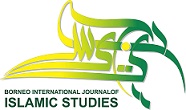Halal Tourism in the Context of Tourism Sector in Tunisia: Controversies, Challenges, and Opportunities
Abstract
This paper examines the development of the tourism industry in Tunisia from its independence in 1956 to contemporary Tunisia with a special focus on the development of halal tourism. In assessing the tourism sector in Tunisia, a typology is used. This typology makes it clear that Tunisia is a prominent tourist destination in several types of tourism, including beach tourism, while in other types it remains underdeveloped. Regarding the emerging form of halal tourism, Tunisia is lagging behind in its development. This may come as a surprise given the fact that Tunisia is a popular tourist destination and a Muslim majority country. Although there are different reasons for this, I would argue that many things can be explained by looking at the political context in Tunisia. The reluctance of government actors hinders the profound development of halal tourism. The policies that have been put forward in the past by Bourguiba and Ben Ali have had an undeniable impact on the general opinion of contemporary Tunisian society on this matter. Even though Tunisia is faced with challenges, Tunisia can still be a suitable country for halal tourism while maintaining other forms of tourism.
Keywords: Tunisia, halal tourism, religious tourism, opportunities and challenges.
References
Battour, Mohamed and Mohd Nazari Ismail, “Halal tourism: Concepts, practises, challenges and future,” Tourism Management Perspectives, Vol. 19, (July 2016): 150-154, https://doi.org/10.1016/j.tmp.2015.12.008.
Bleasdale, Sue, and Heather Jeffrey. “Tunisia: Mass Tourism in Crisis?” In Mass Tourism in a Small World. ed. David Harrison and Richard Sharpley (CABI International, 2017): 1-19.
Carboni, Michele, Carlo Perelli, and Giovanni Sistu. “Developing Tourism Products in Line with Islamic Beliefs: Some Insights from Nabeul–Hammamet.” The Journal of North African Studies, Vol. 22, no. 1 (January 2017): 87–108, https://doi.org/10.1080/13629387.2016.1239078.
Carboni, Michele, Carlo Perelli, and Giovanni Sistu. “Is Islamic Tourism a Viable Option for Tunisian Tourism? Insights from Djerba.” Tourism Management Perspectives, Vol. 11 (July 2014): 1–9, https://doi.org/10.1016/j.tmp.2014.02.002.
Essouaid, Dhia, and Hichem Rejeb. “An Approach to Tunisian Tourism According to the Political Changes between 2011 and 2016.” American Journal of Applied Psychology, Vol. 5, no. 2 (June 2017): 45–49.
Gan, Robert, and José Smith. “Tourism and National Development Planning in Tunisia.” Tourism Management, Vol. 13, no. 3 (September 1992): 331–36, https://doi.org/10.1016/0261-5177(92)90107-I.
Hazbun, Waleed. “Images of Openness, Spaces of Control: The Politics of Tourism Development in Tunisia.” The Arab Studies Journal, Vol. 15, no. 2 (Fall 2007): 10–35.
Horner, Norman A. “Christianity in North Africa Today.” International Bulletin of Mission Research, (April 1980): 83-88, https://doi.org/10.1177/239693938000400208.
Kessler, Kristel. “Conceptualizing Mosque Tourism: A Central Feature of Islamic and Religious Tourism.” International Journal of Religious Tourism and Pilgrimage, Vol. 3, no. 2 (February 2016), https://doi.org/10.21427/D7RB0G.
McCarthy, Rory. “Re-thinking secularism in post-independence Tunisia,” The Journal of North African Studies, Vol. 19, no. 5, (May 2014): 733-50, https://doi.org/10.1080/13629387.2014.917585.
McCarthy, Rory. “The politics of consensus: al-Nahda and the stability of the Tunisian transition.” Middle Eastern Studies, (January 2019):1-16, https://doi.org/10.1080/00263206.2018.1538969.
Merone, Fabio, Sigillò Ester and Damiano De Facci. “Nahda and Tunisian Islamic Activism.” In New Opposition in the Middle East, edited by Dara Conduit and Shahram Akbarzadeh, 177-201. Palgrave: 2018.
Poirier, Robert A. “Tourism and Development in Tunisia.” Annals of Tourism Research, Vol. 22, no. 1 (January 1995): 157–71, https://doi.org/10.1016/0160-7383(94)00053-U.
Poirier, Robert A., and Stephen Wright. “The Political Economy of Tourism in Tunisia.” The Journal of Modern African Studies, Vol. 31, no. 1 (March 1993): 149–62, https://doi.org/10.1017/S0022278X0001185X
Volpi, Frédéric. Political Islam Observed. London: Hurst Publishers, 2010.
Hazbun, Waleed. “Rethinking Anti-Colonial Movements and the Political Economy of Decolonization: The Case of Tunisia." Arab Studies Quarterly, Vol. 16, no. 1 (Winter 1994): 77-106.
Zaiane, Selma. “Heritage Tourism in Tunisia: Development One‐way Choice.” Tourism Review, Vol. 61, no. 3 (March 2006): 26–31, https://doi.org/10.1108/eb058477.


.png)






